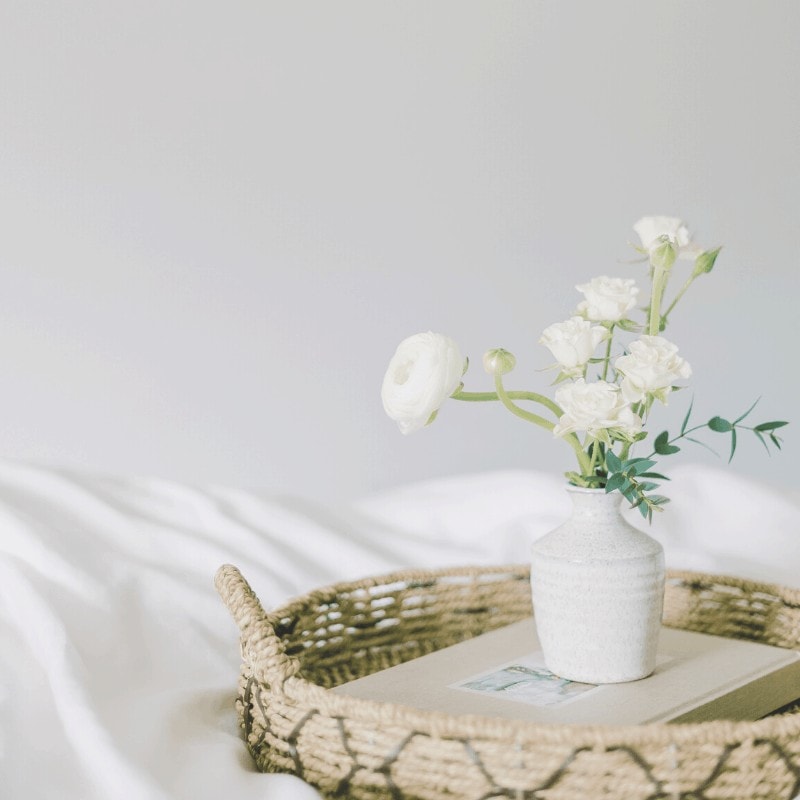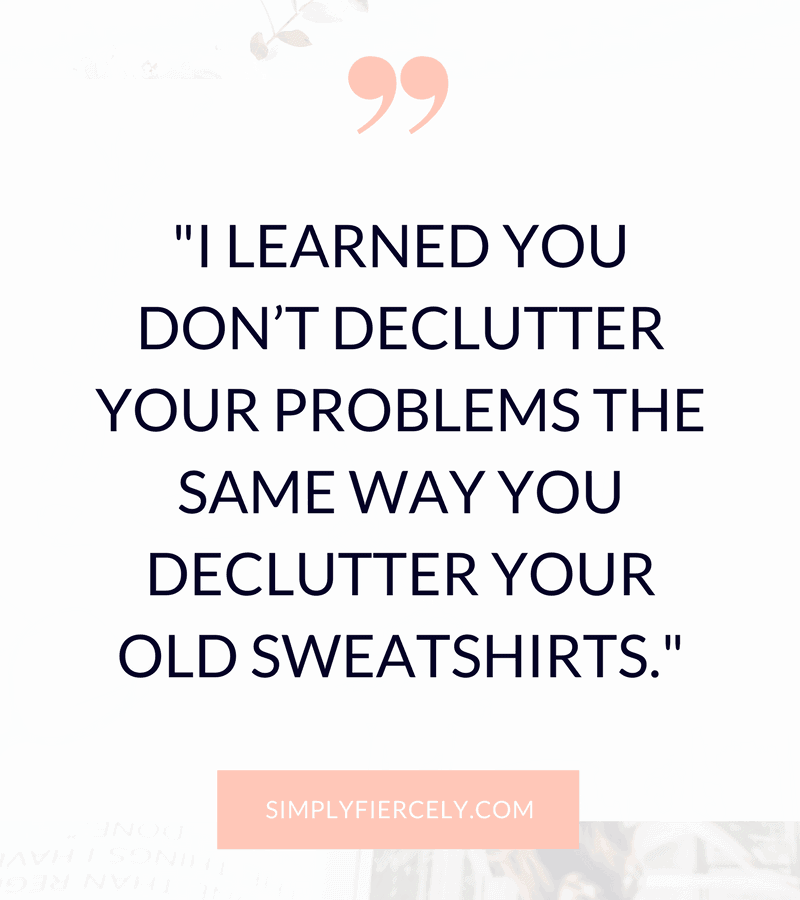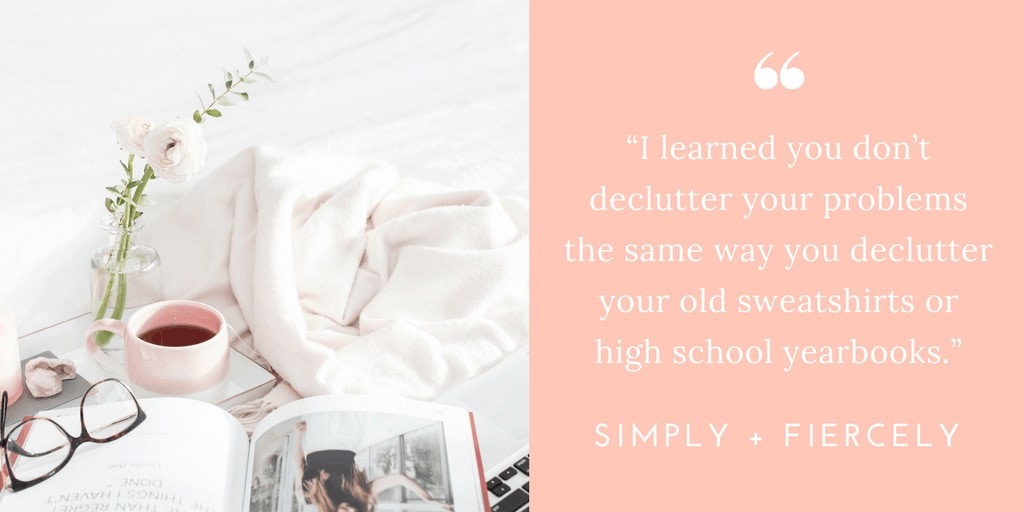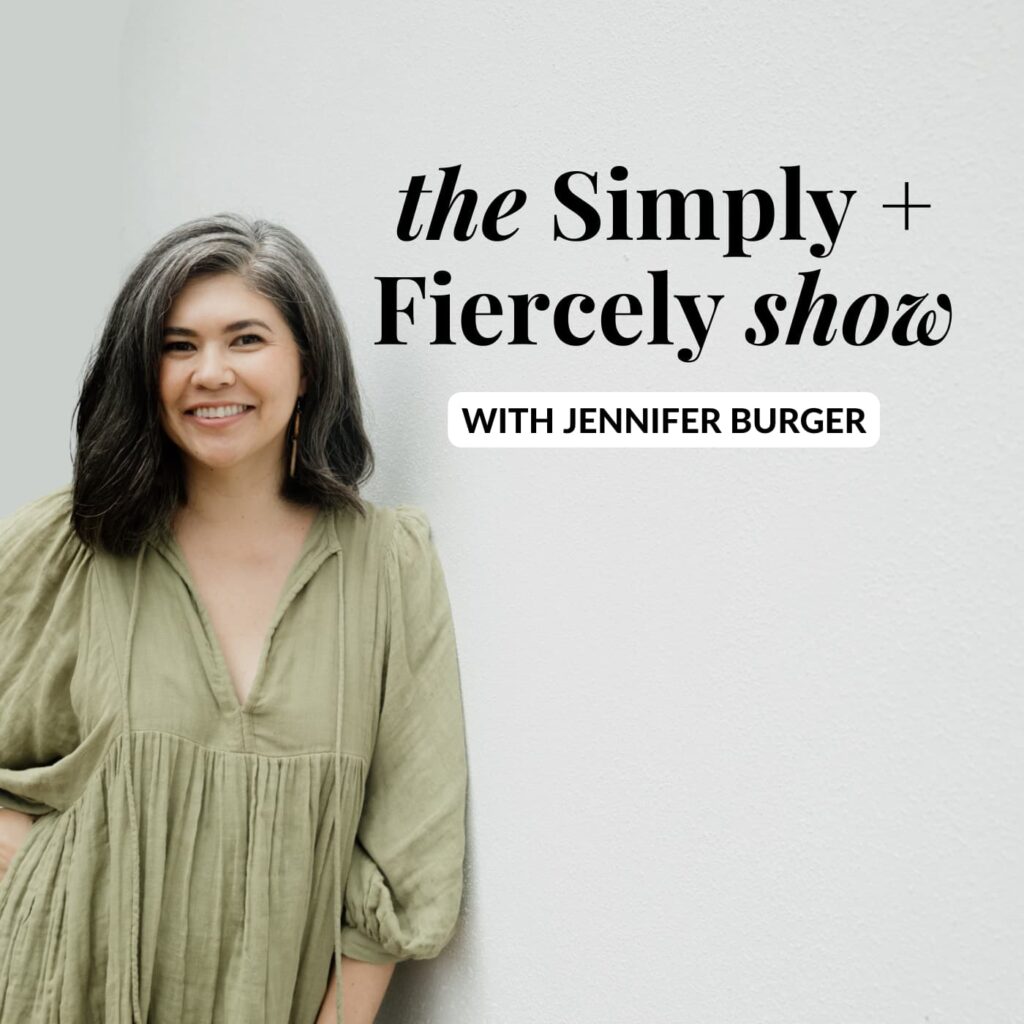Inside: Learn more about the art of simple living, an intentional way of life that balances purpose with ease. It’s about slowing down, setting your priorities, and letting go of the excess that weighs you down.
Modern life is busy, and many are responding by making a conscious effort to embrace a simple lifestyle with more of what matters and less of everything else.
I should know. A decade ago, I was a shopaholic and workaholic, obsessed with material possessions, working long hours—doing more and more and more because it felt like what I was supposed to do. My mental health was in the bin, and I was chronically exhausted, but I thought that was what it meant to “be an adult”.
One day I would retire, and could finally live the good life.
But then I lost a few loved ones, and my personal life started to fall apart. I learned firsthand that sometimes tomorrow doesn’t come, and I decided my peace of mind was more important than a fancy job title and a trendy wardrobe. Little by little, I took small steps towards a simpler lifestyle.
It wasn’t a magic pill, and it didn’t solve all my problems overnight. But those little changes did add up, and these days my life looks completely different. Even with two young children and a small business to run, I have more free time and less stress than ever. I decluttered over 80{a88c2e440a3fe0d009682811ffc0ce83172d8ed124d1bbbcc9619763e6f2b009} of my possessions, changed my shopping habits, and now I have mental freedom that I could never have imagined before.
If you want to learn more, I put together this guide to help you live a simpler way of life. Keep reading for tips, resources and inspiration to help you on your journey.
What is Simple Living?
What comes to mind when you think about simple living? Is it someone living off the grid in a small town, giving up credit cards and cell phones? Or an extreme minimalist in a tiny home with only a handful of possessions?
If this is what you envision, then you’re not necessarily wrong … but these outward characteristics do not define simple living. Instead, they are merely examples of how a select few might choose to manifest simplicity in their lives.
What defines simple living is a way of thinking, and outwardly, it looks different for different people. Some live in tiny homes, and others live in the suburbs, but ultimately, your home doesn’t define you. Instead, ask yourself how you make decisions.
Can you think intentionally about your life, sorting the excess from the essential? Are you living in alignment with your values? Do you know how to slow down, rest and enjoy life—without feeling guilty?
At the end of the day, these thoughts and beliefs matter more than where you live or what you own. Simple living is the art of tuning out the noise so you can hear the desires of your heart and live accordingly.
The Difference Between Minimalism + Simple Living
At this stage, you might be wondering about the difference between minimalism and simple living. Or not—but regardless, the two terms get thrown around a lot, so I want to clarify the difference.
Both lifestyles are built on a foundation of intentional living—ultimately, it’s always about aligning your life with your values and priorities. However, minimalism is more often associated with the elimination of physical clutter and, for some, creating a minimalist aesthetic.
With simple living, owning fewer material things is often part of the journey, but it’s not the main focus. Instead, it’s a byproduct of slowing down and simplifying. Also, not everyone who embraces simple living chooses to have fewer belongings.
Personally, I feel that minimalism and simple living are deeply intertwined—you could perhaps think of them as different sides of the same coin. However, I continue using both terms because it helps me to spread my message and connect with a wider audience.
How to Begin Simplifying Your Life
Work on your mindsets and beliefs
If you’re ready to get started with simple living, I recommend tackling your mindsets and beliefs first. Think about what matters most, and get those thoughts out of your head and down on paper. If you’re a visual person, you could even create a vision board but don’t get caught up in making it perfect.
What matters is that you start thinking about your life and how you want to live it, which might sound ridiculously simple. But in my experience, and in conversation with many of my clients, a lot of women spend so much time doing what they think they’re “supposed” to do that they lose sight of their hopes and dreams.
If you need help getting started, these simple journal prompts can help. I also recommend reviewing these mindsets for simple living and then practising putting them into action in your everyday life.

Take action (the little things matter)
Once you create a vision for your life, the next thing to do is to start living it! Think about all the different things that you do and own, and compare them to the life you want.
Of course, I’m not applying you’ll never have to do things you don’t want to do, or that simple living is synonymous with easy living. Challenges are a part of life, and how we grow—but when we follow the concept of simple living, our challenges are more aligned.
Here are some examples:
These are a few easy things you could try, but it’s not the only way. Here are some ideas that will help “kickstart” your simple living journey or a great first step is my program, 7 Simple Days.
7 Simple Days (Online Course)
7 Simple Days is a short, super affordable program that has helped over 2,500 like-minded souls. The course is designed to:
- bring you clarity and a better understanding of your vision and values
- help you understand what simple living really means to you
- define your priorities, so you can focus on the things that matter most
- inspire you to take small, practical steps towards a life you love
- empower and motivate you to write your own story
It’s simple (of course!) and fun. Here’s what just a handful of participants have to say about it:
“Wow, I just think that anyone wanting to change how they manage their life should look into this course. It was a real eye-opener. After the death of my husband last month, I needed help to understand my new life and how to prepare going forward.” -Robin J, Maryland, USA
“I’m on day four, and already I feel a clarity in my life. My wife and I are doing 7 Simple Days together, and we’ve found that it helps us get on the same page. It’s strengthening our marriage and making us happier.” -Jenna W
“Over the years, I have done research, reading blog posts, following workbooks etc etc., on personal development, minimalism and living intentionally. 7 Simple Days summarizes everything I found out and experienced in my life in such a clear and inspiring way, PLUS I learned more by asking a lot of questions. Thanks!”– Ellen F
Ready to get started? Click here to check out 7 Simple Days.
Ideas + Inspiration to Simplify Your Life
Looking for more simple living ideas and inspiration? These blog posts have tons of practical ideas you can implement today.
3 Hard Truths About Simple Living
As you can hopefully tell, I’m clearly passionate about simple living—but at the same time, I want to make sure I’m offering a clear and balanced view of not just the wonders but also the limitations. Here are a few “hard truths” that you should keep in mind on your journey.
Owning less won’t magically solve all your problems.
“Minimalism sure does suck you in,” she said. “Life looks easier. It seems like your skin will be dewier and your hair shinier — a happier, healthier version of yourself.”
When I read the above quote in the New York Times, I couldn’t help but laugh. It’s a bit tongue-in-cheek, but I understand the point. When I first started to experiment with minimalism and simple living, this is how I felt too. I really wanted to believe that simplifying and getting rid of my stuff was going to magically solve all my problems.
Of course, deep down, I knew better, but I think it’s worth addressing because we want to believe it—or at least I did! After all, it was such a neat and tidy solution to my complicated problems.
Unfortunately, the hard truth I learned is you don’t declutter your problems the same way you declutter your old sweatshirts or high school yearbooks.
Simplifying and owning less feels good, and it can spark real, meaningful change, but it doesn’t happen overnight. You have to be open and willing to take what you learn about “stuff” and apply it to other areas of your life.
Decluttering taught me to think about my values and to make more intentional decisions about the things I owned, so when I was faced with big decisions (like ending a long-term relationship) I knew how to think mindfully about what I wanted in my life.
Simple living empowered me, but I still had to do the hard work.
The Simply + Fiercely Show is a podcast for women who want to clear their clutter and create space for freedom and joy. If your life keeps getting bigger—but not better—then it’s time to declutter from the inside out. LISTEN NOW
Simple living doesn’t mean you’re never stressed or busy.
Trust me—I wish simple living really did banish all stress and busyness from life, but unfortunately, it’s just not the case.
You can declutter, unsubscribe and say “no” all day, every day, but it doesn’t matter how much you simplify—the hard truth is you’ll still occasionally have busy, stressful days where you’d rather hide in bed than face the world.
There will always be dishes to wash, taxes to file, children to feed and hearts to mend; it’s an unavoidable part of the human experience, and simple living doesn’t shield you from it.
Or, as Susan David puts it in her amazing TED Talk on the power of emotional courage:
Only dead people never get stressed, never get broken hearts, never experience the disappointment that comes with failure. Tough emotions are part of our contract with life. You don’t get to have a meaningful career or raise a family or leave the world a better place without stress and discomfort. Discomfort is the price of admission to a meaningful life.
What simple living does mean is that busy and stressed is not my default mode.
Instead, I can recognise that there are seasons in my life. Sometimes I’m doing work that’s important to me, and I’m willing to make sacrifices to get it done—but I’ve learned how to be mindful of “busy”.
I’m not afraid to press pause regularly or to audit how I spent my time, money and energy to make sure I’m investing in what’s most important to me. Simple living has taught me to step off the treadmill when I need to.

There is never a finish line with simple living.
Finally, I often hear people talk about simplifying their lives as if there’s a finish line to cross—an imaginary point in time where simplicity is achieved—but the hard truth is you’ll never be “done” simplifying your life.
Simple living is not a task you can check off of your to-do list. Instead, it’s a way of living where the things we own and do represent our values and priorities. Because we’ll always be presented with new opportunities (and new demands to go with them) there will always be decisions to be made about what does or doesn’t belong in our lives.
This isn’t to say that your life won’t get simpler with time! It’s just a reminder that a simple, intentional life is a way of life and not a destination. It’s rarely easy but almost always worth it.
For more about. the realities of simple living, check out: 3 Heartfelt Lessons On Living A Simple Life
Simple Living Tips + Resources
If you’d like to learn more about simple living and minimalism, here are some additional resources and tips to help you.
What does simple living mean to you? What simple living tip or resources have helped you the most? And what “hard truths” have you discovered on your journey? Let us know in the comments!

